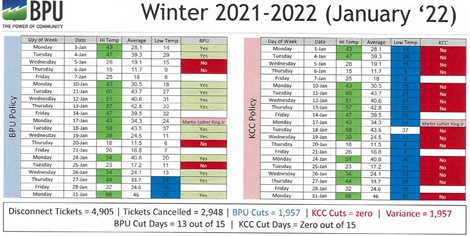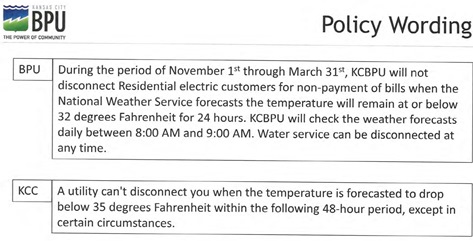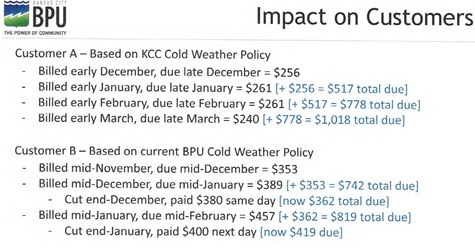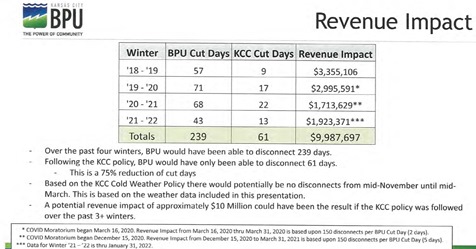Window
Opinion column
by Mary Rupert
Have you ever thought that life is harder in Wyandotte County?
That thought crossed my mind after information was presented at the past two Board of Public Utilities’ meetings.
Kansas City, Kansas, customers of the BPU apparently are more likely to get their electricity disconnected than customers of utilities in other counties, according to information presented at the meetings.
While undoubtedly there are some areas where life is tougher here and other areas where it is easier, this is one area that needs to be looked at, and changed if possible. The utility disconnection can lead to higher bills for residents to get reconnected, starting a downward slide that can lead to some residents becoming homeless, and requiring the community to spend larger amounts of money to take care of them.
The BPU’s cold weather cutoff policy was the subject of a discussion at the meetings. BPU staff presented their findings that included information showing that other utilities did not make that many cutoffs during the winter months, but BPU said many more of its customers were eligible to be disconnected.

Part of the problem was that the other utilities generally had a 35-degree level for cutoffs, while BPU’s was 32 degrees. Also, there was a 48-hour weather window, with temperatures dropping below 35 in the next 48 hours for other communities, as opposed to temperatures dropping below 32 degrees for a 24-hour window for BPU customers.

The issue was brought up by Jared Emmons, a resident, at a previous board meeting. The community should thank him for drawing attention to a policy that potentially leads to systemic hardships on the poor. While other community members have long complained about the cutoff policy, Emmons brought in information showing how the local policy compared to those of private utilities, which are under the Kansas Corporation Commission.

While some of the board members seemed to favor a change in the cutoff policy, Bob Milan Sr. pointed out that it does customers no favors to carry the debt, allowing the debt to grow higher and higher. The BPU staff also presented information showing that after the cutoffs or the cutoff notifications, many customers came forward to pay their bills and get their lights on again.
At its meeting March 2, the board discussed a committee review, getting more information, with different policies spelled out, and staff recommendations, and address the topic again at an April meeting.
One factor that makes the BPU different from private electric utility bills is that there are a number of extra charges the Unified Government places on the bills, including the payment in lieu of taxes (PILOT) fee, which is like a franchise fee, along with trash bills, sewer fees and other charges. If electric and water charges were all that was on the bill, many residents wouldn’t have trouble paying them.
While lots of BPU candidates in the past have advocated for decoupling the PILOT fee from the BPU bill, nothing has been done yet. The UG has put the PILOT fee on the bill, and can lower it if it wants, but so far, the UG has approved the PILOT fees at budget time each summer. There has been some support on the UG Commission for lowering the PILOT fee, but apparently the UG would like to keep that revenue or replace it some other way. I’ve noticed an effort by the new UG mayor and administration to go after more federal grant money this year.
The BPU has always had some customers who couldn’t pay their bills, and there have been several programs operating in the community to provide funding for these customers. However, with the pandemic’s high unemployment and the past moratorium on cutoffs, these monies were in short supply the past few years. A state program used federal funding to keep the lights on for some customers, but the program was designed in such a way that it was too difficult for many customers to access and to fill out their forms. Also, the BPU offers several ways for customers to pay their bills, including payment plans.
As BPU board members pointed out at their recent meeting, there may be another factor at work here. The weather itself has been changing in recent years. There have been more see-saw extreme weather days, with temperatures 70 degrees in the daytime, falling to 25 degrees at night, up and down over weeks in the springtime. The BPU’s policy may have worked better several years ago, when there weren’t as many ups and downs in the forecast.
BPU staff estimated that during the past four winters, if BPU had used the KCC policy guidelines, they would have been able to disconnect only on 61 days instead of on 239 days, a 75 percent reduction of days when disconnections could be made. The staff estimated it would cost the BPU almost $10 million in revenue.

The PILOT fees on the BPU bills, and the resulting cutoffs on electricity of those who can’t pay it, need to change. It operates like a regressive tax on the people who can least afford it. The UG needs to find another way to fund the UG government, other than the BPU bills. The BPU needs to widen its cold weather rule to 48 hours and 35 degrees, following similar policies that the KCC mandates to private utilities.
There is no reason why Wyandotte Countians should find life harder here.
To reach Mary Rupert, editor, email [email protected].
